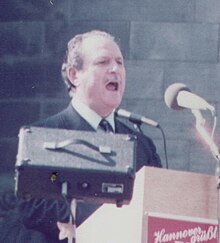Loading AI tools
British politician (1914–2000) From Wikipedia, the free encyclopedia
Bernard Richard Braine, Baron Braine of Wheatley, PC (24 June 1914 – 5 January 2000)[2] was a Conservative Party politician in the United Kingdom. He was a Member of Parliament (MP) for 42 years, from 1950 to 1992, representing constituencies in Essex.
The Lord Braine of Wheatley | |
|---|---|
 Braine in Hanover, September 1983 | |
| Father of the House of Commons | |
| In office 18 May 1987 – 9 April 1992 | |
| Speaker | |
| Preceded by | James Callaghan |
| Succeeded by | Edward Heath |
| Shadow Minister for Overseas Development | |
| In office 4 October 1967 – 15 June 1970 | |
| Leader | Edward Heath |
| Preceded by | Richard Wood |
| Succeeded by | Judith Hart |
| Member of Parliament for Castle Point South East Essex (1955–1983) | |
| In office 26 May 1955 – 16 March 1992 | |
| Preceded by | Constituency established |
| Succeeded by | Bob Spink |
| Member of Parliament for Billericay | |
| In office 23 February 1950 – 6 May 1955 | |
| Preceded by | Constituency established |
| Succeeded by | Richard Body |
| Personal details | |
| Born | 24 June 1914 Ealing, London[1] |
| Died | 5 January 2000 (aged 85) Southend, Essex[1] |
| Political party | Conservative |
| Military service | |
| Rank | Lieutenant-Colonel |
| Unit | North Staffordshire Regiment |
He was educated at Hendon County Grammar School,[3] and served with the North Staffordshire Regiment in the Second World War, rising to the rank of Lieutenant-Colonel.
In 1948, Braine opposed GATT, arguing that it limited imperial preference.[4]
Having stood unsuccessfully for Leyton East in 1945, Braine was elected as MP for Billericay at the 1950 general election. When constituency boundaries were revised for the 1955 election he was returned for the new South East Essex constituency, and when that constituency was abolished for the 1983 general election, he was elected for the new Castle Point constituency, becoming Father of the House of Commons in 1987 after James Callaghan's elevation to the House of Lords.
During his long parliamentary career, Braine served as a junior Minister variously for Pensions, Commonwealth Relations and Health.[1]
He was chairman of the National Council on Alcoholism, and author of the report Alcohol and Work (1977), widely known as the Braine Report.[5] He was a member of the Parliamentary Groups on Human Rights and against abortion. For many years he served as an unofficial ambassador of HM's government to the Polish Government-in-Exile in London. He was knighted in the 1972 New Year Honours, and appointed as a Privy Counsellor in 1985.
Braine championed many causes involving oppressed people. Among them was the Campaign for the Defence of the Unjustly Prosecuted, of which he was President and later Chairman during 1980–1987.[6] In this capacity and in collaboration with the exiled journalist Josef Josten, he campaigned vigorously for the release from prison of the dissident playwright Vaclav Havel, who later became President of the Czech Republic. He was decorated by Havel at a ceremony in Prague Castle on 28 October 1995.
Braine stepped down from Parliament at the 1992 general election, and on 10 August that year he was made a life peer as Baron Braine of Wheatley, of Rayleigh in the County of Essex.[7] He died in January 2000 at the age of 85.
|
Seamless Wikipedia browsing. On steroids.
Every time you click a link to Wikipedia, Wiktionary or Wikiquote in your browser's search results, it will show the modern Wikiwand interface.
Wikiwand extension is a five stars, simple, with minimum permission required to keep your browsing private, safe and transparent.